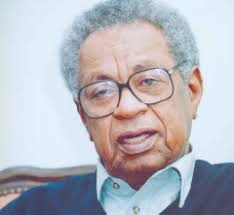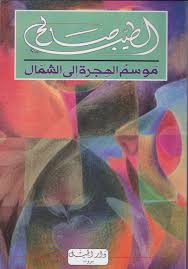Tayeb Salih (Arabic: الطيب صالح; 12 July 1929 – 18 February 2009) was one of Sudan's greatest authors of the twentieth century
His novel Seasons of Migration to the North was our book selection for the month of
Find more information on the author and his work on the book's page
"Everyone starts at the beginning of the road, and the world is in an endless state of childhood."
Tayeb Saleh, Season of Migration to the North
Tayeb Saleh also spelled Tayib Saleh or Tayib Saleh was born in 1929 in the Northern Province of the Sudan and has spent most of his life outside the land of his birth .He attended quranic school as a child, and Gordon College in Khartoum for his secondary school education. He went first to the University of Khartoum and coming from a background of small farmers and religious teachers, his original intention was to work in agriculture. However, after a brief period working as a teacher, he moved to London. He went to university in England before working at the BBC as Head of Drama in the Arabic Service.He later worked as Director-General of Information in Qatar in the Arabian Gulf; with Unesco on Paris and as Unesco's representative in Qatar. Culturally, as well as geographically, Tayeb Saleh lives astride the East and West. In addition to being well-read in the literature of the West, his reading embraces the wide range to be found in the classical Arabic tradition as well as the rich literature of Islam and Sufism.
Saleh's writing, drawn from his experience of communal village life, centres on people and their complex relationships. At various levels and with varying degrees of psychoanalytic emphasis, he deals with themes of reality and illusion, the cultural dissonance between the West and the exotic orient, the harmony and conflict of brotherhood, and the individual's responsibility to find a fusion between his or her contradictions. These motifs and their contexts derive from both his Islamic cultural background and the experience of modern Africa, both pre- and post-colonial. In his novels, Al-Rajul al Qubrosi (The Cypriot Man, 1978), Urs al Zayn (The Wedding of Zein, 1969), Mawsim al-Hijra ila al-Shamal (Season of Migration to the North, 1969), and Daumat Wad Hamid (The Doum Tree of Wad Hamid, 1985), he constructs an impervious unity of the social, religious, and political essence of the African or African Arab. He firmly holds that a harmony of existence is possible for individuals in a society of values and ethics. His books have been translated into several languages.
His novella The Wedding of Zein was made into an Arabic film and won an award at the Cannes Film Festival in 1976. He has also written many short stories which are considered among the best in modern Arabic literature.
In his Season of Migration to the North, Saleh confronts us, as his character does, with the clash that takes shape in one's mind when torn between two cultures.He transfers this turbulent journey to us, hence we are forced to wonder the actions we would have taken when faced with them. Writing is indeed a "tedious business" as Saleh puts it. Creating his "fictional worlds" is not easy. There is little consolation for those who enjoy the "role of being a writer" believes Saleh. Ernest Hemingway was a "mediocre writer"; while Charles Dickens is one of the "great writers" simply because, says Saleh, he managed to enjoy writing and doing other things in life as well.Becoming involved in the details of daily living would make a literary talent come to life, believes Saleh. The "mood has to take over" so that a writer is able to create. But Saleh has always strongly denied that any of his fictional characters resemble him in reality.Some critics have drawn this conclusion based on the fact that Saleh's main character in Seasons of Migration to the North, Mustapha Saeed, lives the contradictions when one is exposed to dissimilar cultures. Saleh, a native of Sudan, lived for a long time in England as a student. Saeed also comes from a developing world and migrates to the developed.But Saleh wards off the drawing of such similarities. Writing requires creating a distance between artistic expression and reality, believes Saleh. In Seasons of Migration, "the writing is its own justification" and the "novel is a world with its own rationale", says Saleh. He sternly believes that since a novel is fictional, reality therefore should not become part of it.Ironically, the novel, Seasons of Migration to the North, was banned in Saleh's native Sudan for a few years despite the fact that it won him prominence and fame worldwide. The novel is also listed as required reading and taught as part of courses at many universities.The novel's importance is drawn from the dilemma its main character lives through. Eventually, we as readers live through the same experience as we come to question the options that we may have taken if we were in Saeed's place.As he leaves his hometown for a 'foreign' country, we feel alienated, as he does and embark with him on a soul-searching journey. Like Saeed, we are alienated and torn between two worlds, yet being neither 'here' nor 'there'. Saeed no longer belongs to his society of origin, one which he differed with in thought and practice. Yet he does not also belong to the one he had migrated to for it has not fully approved him as part of it hence allowing him to transform and grow. In both places, he is a stranger.What novelist Saleh has tried to describe is the delicate transition that societies in the developing world went through as they passed through an era of colonisation to freedom. This was an attempt to come into being, which Saleh has magnificently been able to describe in Seasons of Migrations to the North.Here, the migration is the yearning to ascend into a world that is free, not only from the colonisers but from restrictions and limitations posed by society, and most importantly, by an individual's state of mind.And it is this that had attracted readers to Saleh's writings. What bonded them with this novel is perhaps the fact that many saw the reflection of their own soul as it yearned for freedom.





